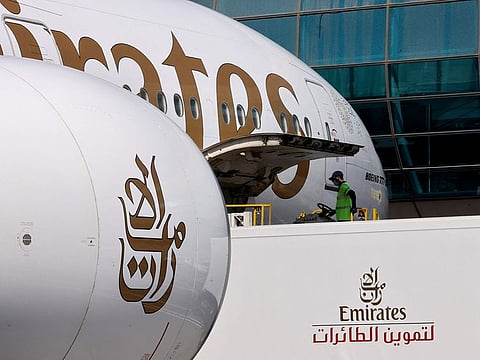Dubai flight cancellations: Emirates extends suspension of operations to Iran, Iraq as conflict escalates
Dubai's flagship carrier halts services to Tehran, Baghdad, and Basra

Dubai: Emirates, Dubai's flagship airline, has announced the extension of its temporary suspension of all flights to Iran (Tehran) and Iraq (Baghdad and Basra) until Monday, June 30. This decision is in response to the evolving regional situation.
The airline confirmed that all other network destinations are operating as scheduled. However, the extended suspension for Iran and Iraq reflects continued concerns over airspace safety and stability in those areas, which have been impacted by the escalating Israel-Iran conflict and recent US military actions targeting Iranian nuclear sites.
Customers whose travel plans are affected by these cancellations are strongly advised to contact their travel agency for assistance with rebooking.
A critical point for travellers is that customers connecting through Dubai with final destinations in Iraq and Iran will not be accepted for travel at their point of origin until further notice, the airline said. This measure aims to prevent passengers from being stranded due to the ongoing flight suspensions.
Emirates has apologised for any inconvenience caused to its customers, reiterating that it continues closely monitoring developments in the region. The safety and security of its operations remain the airline's utmost priority amidst the fluid geopolitical landscape.
EU, US airlines cancel flights
Many US, European, and international airlines have cancelled or rerouted flights to Dubai and other Gulf countries. This comes as the escalating conflict between Israel and Iran, now involving US military action against Iranian nuclear sites, creates significant disruption in the Middle East's vital airspace.
For over 10 days, the typically busy skies stretching from Iran and Iraq to the Mediterranean have dramatically reduced commercial air traffic. Airlines are diverting, delaying, and cancelling services due to heightened safety concerns, airspace closures, and the risk of missile or drone activity.
Major airlines like British Airways, Air France-KLM, Singapore Airlines, American Airlines, United Airlines, Air Canada, and Finnair have all announced adjustments to their services.
The closures of Russian and Ukrainian airspace due to ongoing war had already made Middle Eastern routes crucial for connecting Europe and Asia. Now, airlines are forced to take even longer detours, primarily rerouting flights north via the Caspian Sea or south through Egypt and Saudi Arabia.
According to travel agents, these extended routes increase flight times and fuel and crew costs, challenges compounded by rising global oil prices in the wake of the US strikes.
GPS interference
Beyond direct conflict zones, the aviation industry is also grappling with increased airspace risks from "location spoofing" and GPS interference, which can send commercial airliners off course.
Flight tracking services like Flightradar24 have reported a "dramatic increase" in such incidents over the Arabian Gulf. Aviation security organisations warn that the latest US actions could heighten threats to American and allied operators throughout the Gulf states.
Passengers with travel plans to or from Dubai and other Gulf destinations are strongly advised to check with their respective airlines for the latest flight status before heading to the airport. Many airlines are offering rebooking or refund options for affected travellers.
Here is what passengers need to keep in mind:
Passengers are strongly advised to check their airline's official website or app for the most up-to-date information on flight status before heading to the airport.
Many airlines are offering rebooking or refund options for affected travellers
Travellers connecting through Dubai or Abu Dhabi to suspended destinations may not be accepted for travel at their point of origin.
Sign up for the Daily Briefing
Get the latest news and updates straight to your inbox






